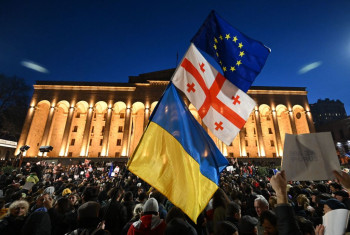Georgian authorities withdraw controversial bill that prompted massive protests
Georgia's ruling Georgian Dream party and the pro-Russian Power of the People party said on March 9 that they had withdrawn a controversial bill that triggered large-scale protests.
The bill, which was passed by the Georgian parliament in the first reading on March 7, seeks to require Western-funded NGOs to register as "foreign agents" and restrict their activities. Opponents of the Geogian government argue that the bill is a copy of Russian dictator Vladimir Putin's auhoritarian foreign agent law and will put an end to Georgia's aspirations to join NATO and the EU.
The legislation prompted massive protests on March 7-8, with tens of thousands taking to the streets, clashing with the police, building barricades and trying to storm the parliament building. The police have cracked down on the demonstrators, using water cannons and tear gas and beating up some of the protesters.
Meanwhile, Georgian activists have stated that they intend to continue protests later on March 9, according to SOVA, a Georgian news site. The activists are also demanding clarification from the parliament on how they plan to revoke the bill in addition to the release of arrested protestors.
"There are many young people who do not trust the Georgian Dream and believe that we are the guarantor of the country's rapprochement with the West,” Tsotne Koberidze, a member of the Girchi-More Freedom party, said, as cited by SOVA.
According to Koberidze, the protests will not stop until Georgia takes a "guaranteed pro-Western course."
A statement released by the Georgian Dream, as cited by SOVA, claimed that they will begin meetings with the public to explain why the bill is "important," adding that they do not want the Georgian citizens to focus on confrontation.
The foreign agent bill would require organizations that receive over 20% of funding from overseas to register as “foreign agents.”
Many non-governmental organizations have criticized the legislation, saying that it violates international human rights law.
“The ‘foreign agents’ bills seek to marginalize and discredit independent, foreign-funded groups and media that serve the wider public interest in Georgia,” said Hugh Williamson, Europe and Central Asia director at Human Rights Watch.
Russia's "foreign agent" law, which is similar to the Georgian one, requires organizations that receive funding from abroad or are perceived by the Kremlin to have been influenced by foreign entities to register as a "foreign agent."
The law mandates these organizations to undergo rigorous financial audits and to label all their content with a disclaimer stating that it is being distributed by a "foreign agent." However, this law is often used as a means to target and silence groups and individuals who are critical of the government.
In recent months the Georgian government has spoiled its relations with the West and Ukraine and drifted into Russia's orbit despite the fact that 20% of Georgian territory is currently occupied by Russia.
Specifically, Western governments and organizations have lambasted the Georgian authorities for mistreating pro-Western ex-President Mikheil Saakashvili.
Saakashvili, who has Ukrainian citizenship, is currently serving a six-year prison sentence on charges of abuse of power in a case that he says is political and fabricated. After several hunger strikes, his health has taken a drastic turn for the worse.
On Feb. 1, the media published photos that show signs of his worsening health and rapid weight loss.
The EU Ambassador to Georgia Pawel Herczynski said on Feb. 27 that he had submitted a statement of protest to Georgia calling for the release of Saakashvili so that he can receive medical treatment in Poland. The Georgian government rejected the demand.
Saakashvili has accused oligarch Bidzina Ivanishvili, the de facto leader of the Georgian Dream, of being a tool of the Kremlin and of persecuting the ex-president on Putin's orders, which Ivanishvili denied. Ivanishvili used to be a major businessman in Russia and has sought closer ties with the Kremlin since coming to power in 2012.










